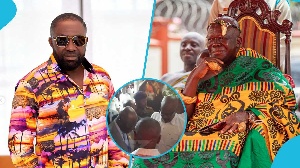- Home - News
- Elections 2024
- News Archive
- Crime & Punishment
- Politics
- Regional
- Editorial
- Health
- Ghanaians Abroad
- Tabloid
- Africa
- Religion
- Photo Archives
- Press Release
General News of Wednesday, 23 April 2025
Source: www.ghanawebbers.com
How Ghanaian youth are losing the plot on social media and in national discourse
Ghanaian Youth: From Hope to Chaos
Not long ago, Ghanaian youth were seen as hopeful leaders. They were champions of change and digital innovators. Today, many have turned their hope into chaos. They now attack elders, ethics, and common sense.
Common sense used to be as common as kenkey and pepper. Now it’s rare, hunted like gold in the forest. Instead, we see a new trend: uncommon sense. This is loud, angry, and often filled with slangs.
I. The Digital Megaphone: Freedom Gone Wild
Once, Facebook and Twitter were for sharing vibes and food pics. Now they are battlegrounds where insults fly freely.
Ghanaian youth use their midnight data to become part-time lawyers or analysts. With WhatsApp, they act like chief editors of news outlets. They create fake evidence faster than power outages occur.
An old saying warns us about poor mentorship. Sadly, our role models are TikTok influencers who misinterpret history.
II. Politicisation of Everything
In Ghana, everything is politicized except accountability. Illegal mining isn’t just about rivers; it’s about party loyalty.
When a respected chief speaks on galamsey issues, we don’t ask if he’s right. We question his motives instead.
If the sun fails to rise tomorrow, Ghanaians will blame political parties rather than check the weather.
Youth on social media reduce every issue to petty arguments about blame.
III. Tribalism Reloaded
Once upon a time, children from different tribes played together happily. Now tribal tensions have become an online sport.
When someone from Volta speaks up, others respond with stereotypes about Ewes. Northerners face similar backlash when sharing opinions.
It’s tragic because our ancestors fought colonialists together—not each other.
Today’s youth fight with keyboard insults instead of unity.
IV. The Clout Chasers' Republic
In Ghana today, fame is easily gained through outrageous statements or viral dances.
Youth have learned how to go viral without adding value to discussions. They lie or provoke just for attention online.
One girl claimed she met Jesus; another said she saw Nana Addo jogging at midnight—truth doesn’t matter if retweets follow.
V. Economic Struggles and Frustration
We can’t blame them entirely for their behavior; hunger breeds anger among citizens.
Youth unemployment is rising sharply in Ghana today.
Frustrations spill onto social media as jobless graduates lash out at politicians.
Tired and broke youth log onto X looking for trending hashtags to vent their frustrations.
VI. When Free Speech Becomes Verbal Violence
Freedom of speech is protected by our Constitution but must come with discipline.
What we see now isn’t debate—it’s demolition of respect.
Insults fly toward pastors and politicians alike for mere retweets.
One young man insulted a statesman by comparing him unfavorably to Mandela.
The same mouth that says grace also curses elders—leading to scarce blessings in return.
VII. Restoring Sanity: A Call for Common Sense
There is hope among the youth promoting respectful debate online.
Digital creators are teaching values and civic duties effectively.
We must support these efforts across all platforms—from campuses to local shops.
Elders should mentor wisely instead of acting like trolls online.
Youth need to remember that trending topics aren’t always thoughtful discussions.
Let’s use our keyboards constructively—to build rather than break down society.
Final Word: When Chickens Bark…
When chickens start barking or dogs lay eggs, uncommon sense prevails.
Yet not all hope is lost; we can restore decency in discourse.
The youth of Ghana hold potential—not problems.
It’s time to shift focus from pettiness toward purpose.
As our elders say: “Even when fools speak, wise ones listen—to learn what not to say.”
Business










